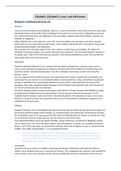Interview
History AQA GCSE Grade 9 Elizabethan England: Elizabeth's Court and Parliament Notes
History AQA GCSE Elizabethan England: Elizabeth's Court and Parliament, printable notes made and used by Grade 9 History student. Contains in-depth facts/research covering every aspect of the specification. Includes analytical-response notes, visual aids, and extremely helpful revision aid for maki...
[Show more]



